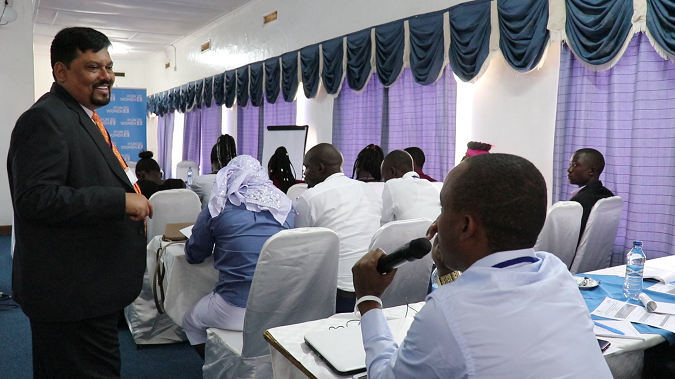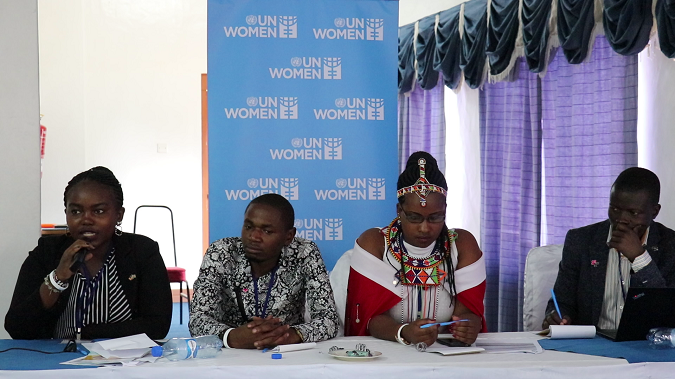Knowledge Seminar on the Role of Student Leadership in Ending Technology Assisted Violence Against Women and Girls (TVAW) in Universities and the Academia
(Kenyan University Student Leaders at the Technology Assisted Violence Against Women and Girls Seminar in Kisumu, Kenya)Date:

Sadiq Syed of UN Women East and Southern Africa regional office interacts with a participant during the event. Photo: UN Women
On Monday the 22nd of July 2019, over 70 student leaders from 30 universities from across Kenya convened to dialogue on their role in ending technology assisted violence against women and girls in Kenya and Africa. UN Women East and Southern Africa Regional Office organized the Knowledge Seminar in collaboration with the University of Maseno’s Institute of Gender Studies.
Dr. Karen Nyambura, the Director for the Institute of Gender Studies, Maseno University, in her opening remarks highlighted the policy commitment for the University in ensuring that students’ study in safe environments. She pointed out that the definition of harassment of students in that policy includes cyber-stalking and online harassment. She encouraged the participating student leaders to lead and teach each other how to protect against online bullying against women and girls.
The seminar highlighted several manifestations of tech-assisted violence against women and girls including revenge porn, cyber enticement, solicitation, online grooming, cyber harassment, cyber bulling and exposure to harmful online content. The enabling factors of technology related violence against women and girls were identified to include among others increasing number of online community users, anonymity, automation, action at a distance, affordability and propagation. Students delved into issues of self-esteem and public opinion which the student leaders noted as factors affecting the mitigation of tech violence.
Dr. Sadiq Syed, Regional Program Manager-EVAW from UN Women highlighted statistics on violence against women which showed that more than 1 in 3 women (36.6%) in Africa report having experienced physical, and/or sexual violence by a partner or a non-partner. Technology assisted violence against women and girls could significantly increase this staggering number, as reports suggest that 73% of women have already been exposed to or have experienced some form of online violence in what must still be considered a relatively new and growing technology. Cybercrime is an evolving form of transnational crime impacting the society in general and women and girls in particular. The complex nature of the crime as one that takes place in the border-less realm of cyberspace is compounded by the increasing involvement of organized crime groups. “Perpetrators of cybercrime and their victims can be located in different regions, and its effects can ripple through societies around the world, highlighting the need to mount an urgent, dynamic and international response”, he emphasized.
Dr Syed welcomed student leaders as responsible citizens and champions who shape the attitude of student fraternity and community on ending tech violence and other forms of violence against women and girls. The seminar featured the recommendations of the UN Women background paper on ‘Digital Footprints: Creating Safe Digital Spaces for Young Women and Girls in Africa.’ One of the key takeaways from the report was that technology assisted violence affects both men and women but 95% of violence committed online affect women and girls. The report also highlighted cyber misogyny revealing various forms of gendered hatred, harassment and abusive behavior targeted at women and girls via the internet. The program also highlighted the protection provided under the international and regional frameworks including CEDAW, Beijing Declaration, ICPD Plan of Action, Agenda 2063 and the national legislation. Statistics on the number of countries that have enacted legislations addressing cyber violence in Africa is minimal and there is a need to enact and update the legislation in tune with the technological developments, the workshop noted.

Plenary discussion allowed for the input of the students showcasing individual experiences on the subject with young women sharing the challenges they experience in universities. The student leaders shared such manifestations of technology assisted violence including body shaming, porn revenge, victimization of women among others.
Ms. Annette Onyango, the Academic Secretary for Moi University Students’ Organization, shared her personal experience on body shaming where she mentioned that women’s sexuality has more often been used against women. Ms. Gladwell Miruki reiterated the critical role of the student leadership and university students in ending technology assisted violence. She said, “Stop and ask yourself what my role is in ending violence. Even that man victimizing me has a story that is not yet told. It is important to self-reflect to end violence.” On the other hand, Ms. Kathy Gitau, the Vice President of Students Organization of Maseno University, emphasized the need to improve the quality of investigations while building a stronger remedy mechanism for the victims and holding perpetrators to account while ensuring stronger linkages to university and local authorities. Student leaders from Jomo Kenyatta University of Science and Technology highlighted the adoption by the University of the Gender Action Plan while Kibabii student leaders also shared experiences of the important role played by the “Gender Clubs” thereby advocating for similar initiatives in other Universities.
The seminar further affirmed the fact that technological innovation has profoundly transformed societies around the world. By the end of 2013, according to UNODC, almost 40 per cent of the world’s population, i.e. 2.7 billion people, and 78 per cent of households in developed countries had access to the Internet. Although only 28 per cent of households currently have access to the internet in developing countries, between 2009 and 2013 there were annual internet access growth rates of 27 per cent in Africa and 15 per cent in Asia and the Pacific, the Arab States and the Commonwealth of Independent States. The percentage of use of social media by women and girls is higher. Along with the rising use of mobile phones, texting by Short Message System (SMS) has emerged as a common means of communication. Between 2007 and 2010, the number of SMS sent globally tripled from 1.8 trillion to 6.1 trillion a year, equaling an average of 200,000 text messages sent every second. Facebook had 1.44 billion monthly active users. This translates to 50 per cent of Internet users worldwide.
The seminar concluded with the signing of a pledge by all student leaders present to take responsibility, acknowledging the crucial role the student leaders play at their universities, and society at large, in remedying and ending tech-assisted violence against women and girls.
#SafeDigitalSpaces.